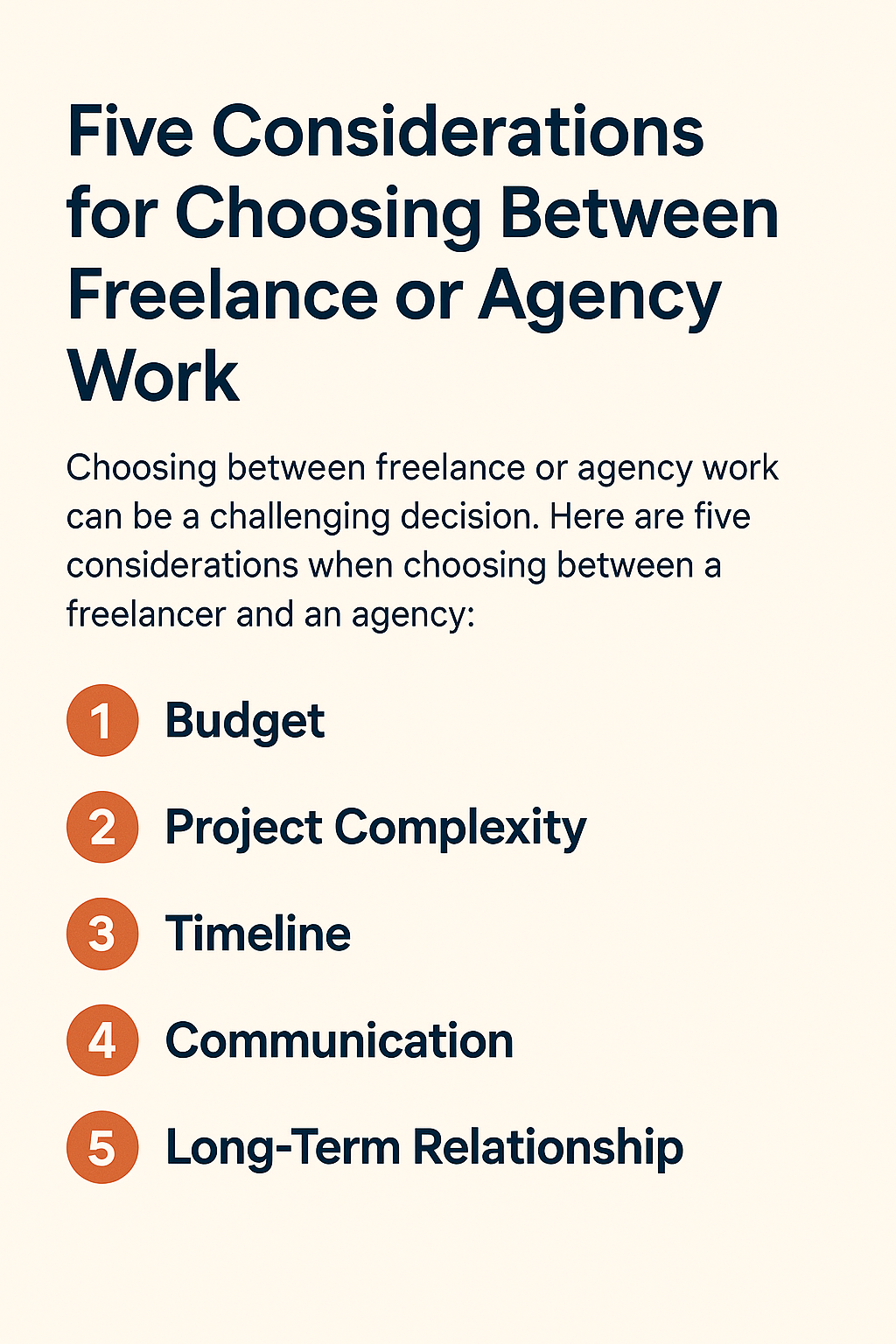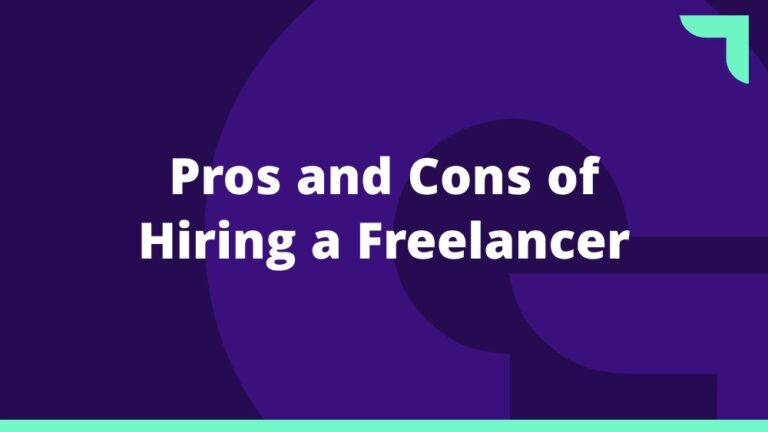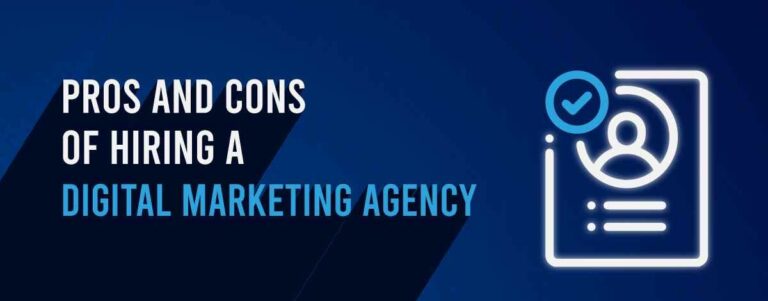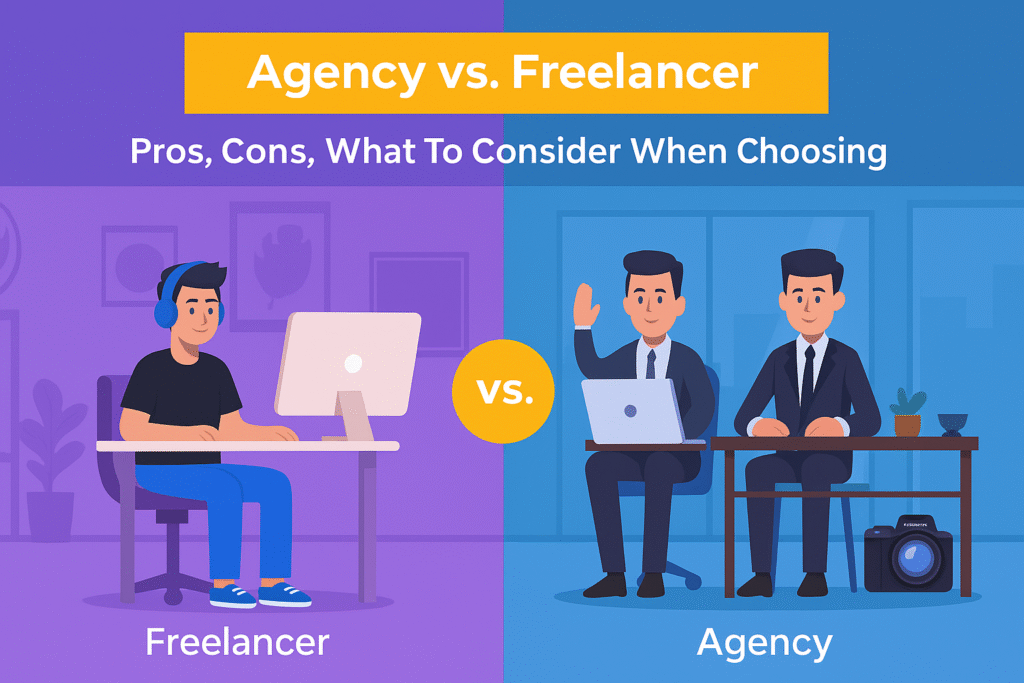Table of Contents
ToggleIntroduction
When it comes to growing your business online, one common dilemma often arises: freelancer vs agency – which is the better fit for your goals? Whether you’re launching a new website, managing social media, or scaling digital operations, understanding the pros and cons of hiring freelancers versus working with a full-service agency can have a significant impact on your success.
Each option offers unique advantages and potential drawbacks. While freelancers provide flexibility and specialized skills, agencies bring a team-based approach and structured workflows. In this guide by Haridarshan Chandnani, we’ll explore the key differences, pros and cons of hiring freelancers, and how they compare to agencies in various digital marketing and development scenarios.
If you’re unsure whether to go with a freelancer or digital marketing agency, this article will help you evaluate your priorities—be it cost, expertise, timelines, or long-term support. From creative freedom to project scalability, understanding the freelancer vs agency decision is crucial.
By the end of this article, you’ll have a clear perspective and actionable insights to decide whether hiring a freelancer or partnering with an agency aligns best with your vision and business strategy.
Five Considerations for Choosing Between Freelance or Agency Work

Choosing between freelance or agency work can be a challenging decision. Here are five considerations when choosing between a freelancer and an agency:
1. Budget: As a rule of thumb, hiring a freelancer is typically more cost-effective than hiring an agency. It’s important to evaluate your budget constraints before proceeding with your decision.
2. Project Complexity: If your project requires various skill sets and comprehensive solutions, an agency can be a better choice due to its diverse team and resources.
3. Timeline: Agencies can generally complete large projects more quickly due to having more hands on deck. If time is of the essence, consider going with an agency.
4. Communication: With a freelancer, you will likely communicate directly with the person doing the work. It can lead to a more streamlined communication process. With an agency, however, you might communicate with a project manager who then communicates your vision to the team.
5. Long-Term Relationship: Consider whether this is a one-off project or a long-term relationship. Agencies often can take on long-term client relationship, evolving work, while freelancers may be a good fit for smaller, well-defined projects.
Pros & Cons of Hiring a Freelancer

What You Can Gain or Risk with Freelancer
Hiring a freelancer can offer significant advantages, especially for startups and small businesses looking for personalization and cost-efficiency. One of the main pros of hiring freelancers is having direct access to specialized talent—without the layers of account managers or red tape common in agencies. Freelancers often provide quicker turnarounds, working flexible hours and bringing in-demand, niche skills to the table.
However, understanding the pros and cons of hiring freelancers is essential. Many freelancers manage multiple clients, which can lead to delayed responses or inconsistent availability. For complex or long-term digital marketing strategies, a single freelancer might lack the capacity or structure to handle all aspects effectively.
According to Haridarshan Chandnani, when choosing between a freelancer or agency for business, you must evaluate the scope, timeline, and complexity of your project. While freelancers are ideal for tasks like content writing, web design, or social media posts, they may fall short when it comes to executing large-scale, multi-channel campaigns.
So, while the freelancer vs agency debate often highlights freelancers for their affordability and flexibility, scalability and accountability are key factors that shouldn’t be overlooked. Weigh the pros and cons of hiring freelancers carefully to align your choice with your business goals.
Pros of Hiring a Freelancer
The freelance lifestyle offers many benefits that traditional desk jobs simply can’t match. The most prominent ones include:
1. Cost-Effective: Freelancers typically have lower overhead costs than agencies, and hence they can often provide their services at a lower rate.
2. Specialized Services: Freelancers are often specialists in their fields, making them ideal for highly specialized projects that require specific expertise.
3. One-on-one Consultation: Working with a freelancer gives you direct access to the individual performing the work, allowing for more personalized attention and better communication of your vision.
4. Specialized Expertise: Freelancers often specialize in a particular field and can bring deep expertise and high-quality work to specific tasks or projects.
5. Flexibility: As they work independently, freelancers often have more flexibility in their schedules and can adjust their working hours per the project’s needs.
6. Direct Communication: When working with a freelancer, you communicate directly with the person doing the work, which can lead to a more streamlined and efficient communication process.
7. Quick Turnaround: Due to their focus on specific tasks, freelancers may provide quicker turnaround times for smaller, less complex projects.
Pros & Cons of Hiring an Agency

What Agencies Offer that Freelancers Often can't
When evaluating freelancer vs agency for business, it’s important to understand the distinct advantages that agencies bring. Unlike hiring a freelancer, agencies provide a comprehensive, team-based approach—bringing together SEO experts, paid ad managers, designers, and strategists to deliver a unified marketing solution. This integrated setup ensures brand consistency across multiple channels.
One of the major pros of hiring an agency is scalability. As your business expands, an agency can easily allocate more resources to match your needs. With structured project management, clear accountability, and access to premium tools, agencies offer reliability that many freelancers may struggle to match.
That said, there are some downsides. Agencies are generally more expensive than freelancers, and communication can feel slower due to layered management processes. In the freelancer vs agency debate, startups often cite the lack of direct interaction as a drawback when working with agencies, especially if they value a more personal, hands-on experience.
Haridarshan Chandnani recommends choosing an agency when your business goals involve long-term branding, cross-platform marketing strategies, or data-driven decision-making through advanced analytics. Agencies are especially valuable for businesses managing high content volumes or running large-scale digital campaigns.
While the pros and cons of hiring freelancers often highlight affordability and flexibility, agencies shine in delivering reliability, expert execution, and scalability—making them the better choice for growing businesses with complex demands.
Cons of Hiring a Freelancer
Freelance work can be alluring, offering flexibility and the ability to pursue your passions. However, it’s important to consider the potential downsides before taking the leap:
1. Unstable Availability: Freelancers may juggle multiple clients concurrently, which could limit their availability and responsiveness. This might slow down your project’s progress.
2. Skills Limitation: Freelancers might be highly specialized in one area but may lack the range of skills necessary for a complex, multifaceted project.
3. Inconsistency in Quality: Since every freelancer has a unique style and approach, the quality of work may vary based on their skills and experience.
4. Lack of Backup: If a freelancer falls ill or cannot complete your project because of personal reasons, there’s no team in place to pick up where they left off.
5. Lack of Comprehensive Services: Freelancers are individuals who might not provide a comprehensive solution that integrates different aspects of a project like an agency can.
Pros of Working with an Agency
Working with an Digital Marketing Agency can be incredibly beneficial for individuals seeking expert advice, a wide range of resources, and networking opportunities. The significant ones include:
1. Comprehensive Solutions: Agencies often have a team of professionals with diverse skill sets, allowing them to provide comprehensive solutions that cover all aspects of a project.
2. Access to More Resources: Agencies typically have access to a wider range of resources, which can lead to more polished and professional results.
3. Efficient Timelines: With more hands on deck, agencies can often complete larger projects more quickly than a single freelancer.
4. Collaborative Approach: Agencies have teams that work together to deliver the best results, leveraging different talents and skills.
5. Consistency in Quality: Agencies usually have quality control processes in place, ensuring a consistent level of service and output.
6. Backup Support: In case a team member is unavailable, there is always someone else on the team who can step in to ensure the work continues as planned.
7. Long-term Support: Agencies often can take on long-term, evolving work, providing continuous support and maintenance when needed.
Cons of Working With an Agency
When it comes to hiring an Digital Marketing Agency for a project, there are certain downsides to keep in mind. They are:
1. Higher Costs: Agencies often charge more than freelancers due to their overhead costs and the comprehensive services they offer. You might find that hiring an agency is outside of your budget, particularly for smaller projects.
2. Less Personal Attention: While agencies have more resources at their disposal, you may not receive the same level of personal attention and direct communication you would when working with a freelancer.
3. Complex Communication: Working with an agency often means communicating with a project manager, who then relays your feedback to the team. This additional layer can lead to misunderstandings or delays in internal communication.
4. Less Flexibility: Agencies work with multiple clients and big projects, which might make them less flexible in terms of project changes or unexpected adjustments.
5. Longer Turnaround: Because agencies deal with multiple projects at a time, they may not offer the same quick turnaround times as freelancers for smaller tasks.
Ultimately, the decision to work with an agency comes down to weighing the pros and cons and determining what’s best for your particular situation.
Wrapping it Up!
After carefully considering the pros and cons of freelance versus agency work, it can be concluded that working with an agency can provide clients with cost-effective results, but freelancing gives professionals more control over their projects with the added benefit of a flexible workload. In either case, thoroughly evaluating these different elements associated with both options will help them decide what type of collaborative effort will be most beneficial in ultimately achieving their desired goal.
FAQs
Freelancers offer flexibility, cost-effectiveness, and specialized skills. They’re ideal for short-term projects, startups, or tasks requiring a niche expertise. Freelancers usually have lower overhead costs, which means more competitive pricing. You can work directly with the individual, leading to clearer communication. Additionally, they often have faster turnaround times due to fewer layers of approval. However, the downside can be inconsistent availability, especially if they juggle multiple clients. Reliability and long-term scalability may also be concerns if your project or business grows and demands more structured support.
Agencies typically bring a team of professionals with a diverse skill set, making them well-suited for larger or ongoing projects. They provide more structure, with project managers, quality assurance, and standardized processes that ensure consistency. Agencies can scale quickly to meet deadlines and offer more accountability. They’re also more likely to stay current with industry standards and trends. The downside is often higher costs and less direct communication, as you’re dealing with a team rather than an individual. However, for complex, long-term needs, the professionalism and support agencies offer can outweigh the higher price.
Generally, freelancers are more budget-friendly. Their lack of overhead and lean operations allow for lower rates. This is great for startups or businesses with tight budgets. You pay only for the work done, often on an hourly or per-project basis. Agencies, on the other hand, charge more to cover staff salaries, office costs, and administrative overhead. However, agencies may offer a better ROI for large projects that need a multi-disciplinary approach. In essence, freelancers are cheaper upfront, but agencies can be more cost-effective in terms of quality, scope, and strategic value over time.
For long-term projects, agencies often provide more stability. Their structured teams and dedicated account managers ensure continuity, even if individual staff members change. Agencies are equipped to handle evolving requirements, provide consistent updates, and support scaling. Freelancers can also work on long-term projects, especially if you build a strong relationship. However, they may become unavailable or move on to other opportunities. If continuity, growth, and long-term reliability are critical to your business, an agency may be the safer choice, despite the higher cost. Freelancers are great for consistent tasks if you can ensure commitment.
With freelancers, communication is direct and often more personal, which can lead to quick decision-making and a close working relationship. However, freelancers may lack formal project management tools or processes, especially if juggling multiple clients. Agencies typically have dedicated project managers and use professional tools to track progress, timelines, and deliverables. This adds a layer of formality and organization that benefits complex projects. The trade-off is that communication can feel slower or filtered through layers. Choose based on whether you value streamlined communication or structured project execution.
Agencies often have internal quality assurance processes, dedicated teams for editing or testing, and experienced project managers to ensure high-quality outputs. This built-in accountability can be crucial for brand-sensitive or large-scale projects. Freelancers, while often highly skilled, vary more in quality and depend heavily on self-discipline. There’s a risk of inconsistency, especially if no contractual quality standards are set. However, many experienced freelancers take pride in their work and offer top-tier results. Whether you choose a freelancer or agency, vetting past work, checking references, and setting clear expectations are key to quality outcomes.
First, assess the scope, complexity, and timeline of your project. Freelancers are great for specific tasks, creative work, or short-term needs, especially when budget is a concern. Agencies are better suited for comprehensive, multi-layered projects requiring team effort, scalability, and long-term support. Also consider your preferred style of communication, risk tolerance, and need for reliability. Look at portfolios, ask for references, and set clear goals regardless of whom you hire. Ultimately, the best choice aligns with your business goals, project demands, and the level of collaboration and accountability you expect.


